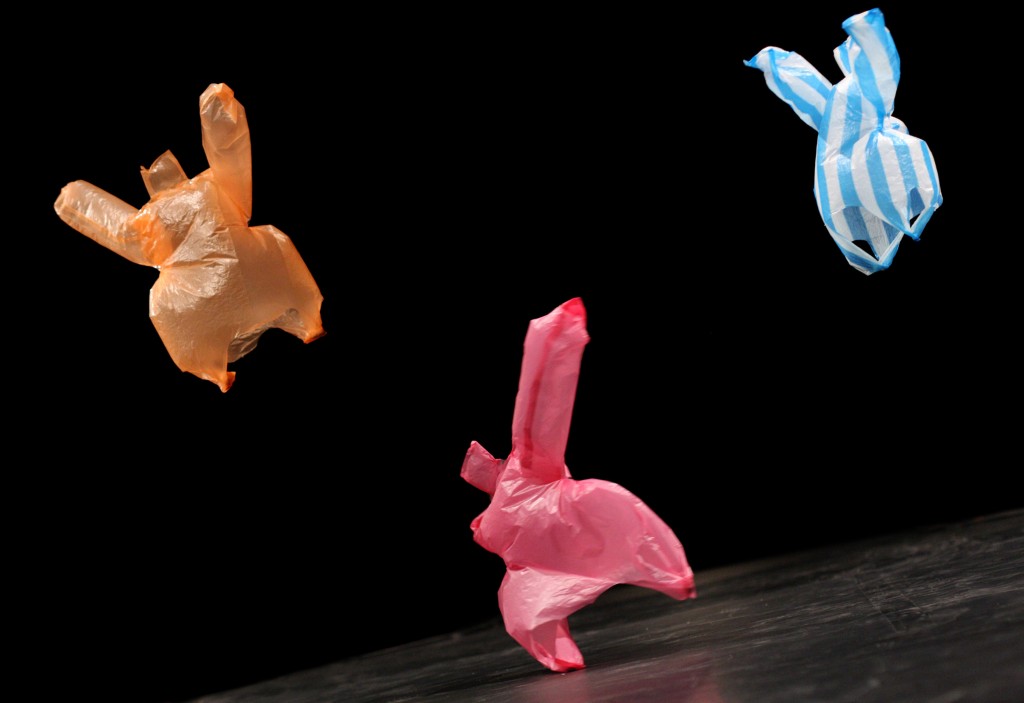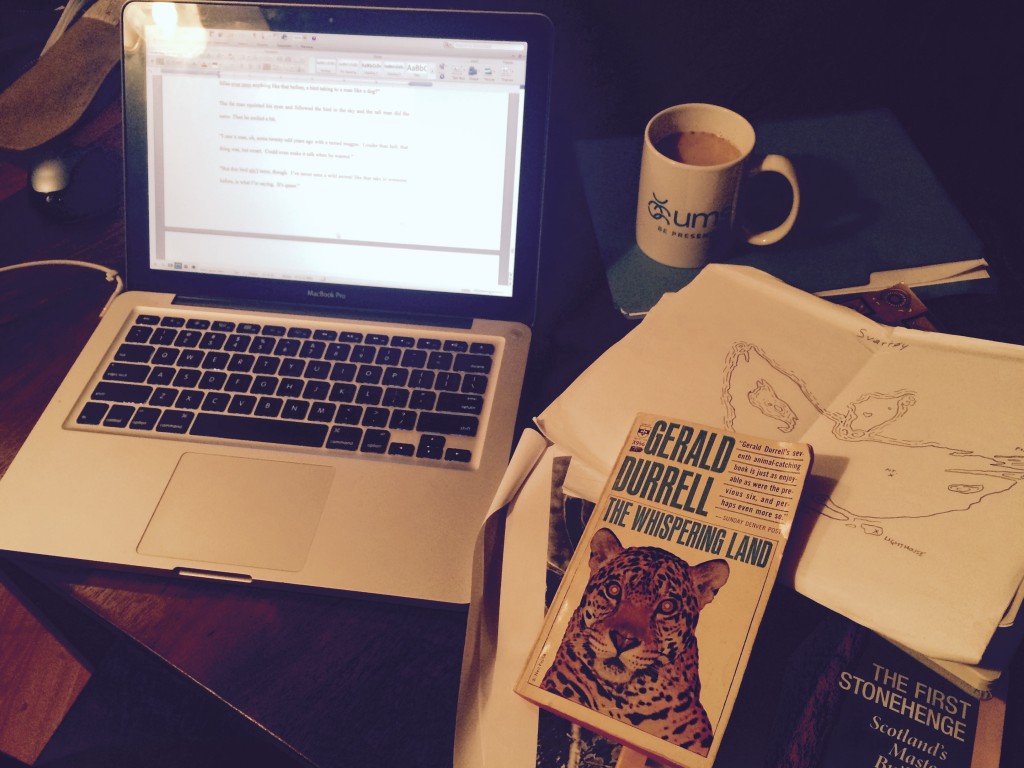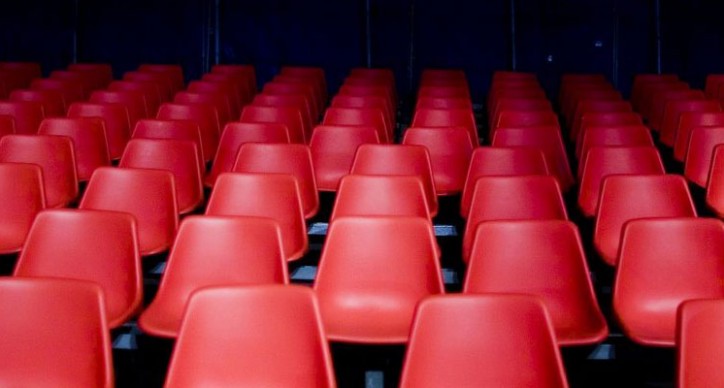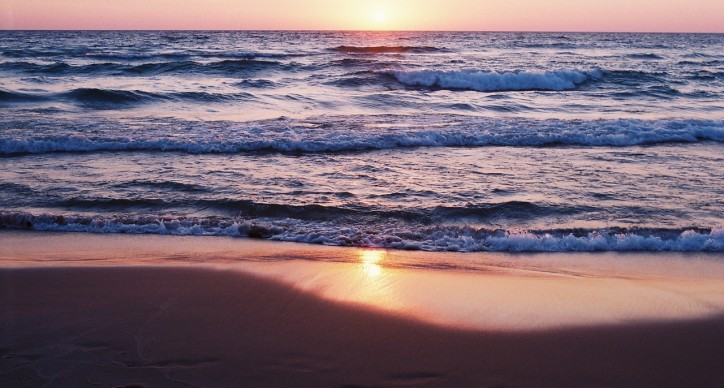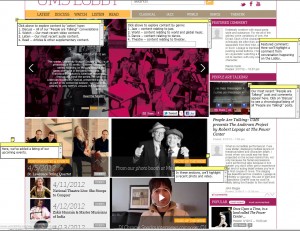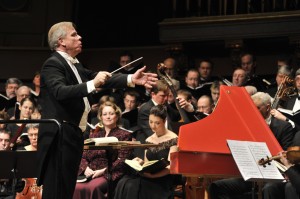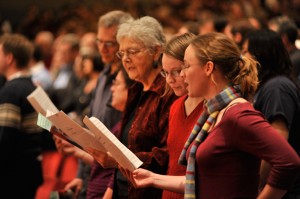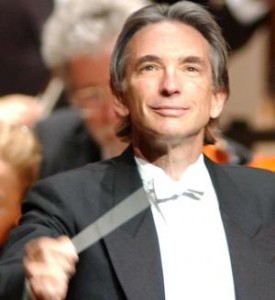People Are Talking: Royal Shakespeare Company Live in HD: Shakespeare’s Henry V

Tell us what you thought! This is the place to comment on the performance and talk to other people about what you saw and heard. What will you remember about the performance one year from now?
Don’t forget to click the option to be notified when new comments are posted. For more information, review our community conversation guidelines.
For more behind the scenes photos, follow us on Facebook, Twitter, and Instagram.
People Are Talking: National Theatre Live: Shakespeare’s Hamlet

Tell us what you thought! This is the place to comment on the performance and talk to other people about what you saw and heard. What will you remember about the performance one year from now?
Don’t forget to click the option to be notified when new comments are posted. For more information, review our community conversation guidelines.
For more behind the scenes photos, follow us on Facebook, Twitter, and Instagram.
People Are Talking: Royal Shakespeare Company Live in HD: Shakespeare’s Othello

Tell us what you thought! This is the place to comment on the performance and talk to other people about what you saw and heard. What will you remember about the performance one year from now?
Don’t forget to click the option to be notified when new comments are posted. For more information, review our community conversation guidelines.
For more behind the scenes photos, follow us on Facebook, Twitter, and Instagram.
People Are Talking: National Theatre Live: George Bernard Shaw’s Man and Superman

Tell us what you thought! This is the place to comment on the performance and talk to other people about what you saw and heard. What will you remember about the performance one year from now?
Don’t forget to click the option to be notified when new comments are posted. For more information, review our community conversation guidelines.
For more behind the scenes photos, follow us on Facebook, Twitter, and Instagram.
People Are Talking: National Theatre Live: Arthur Miller’s A View From the Bridge

Tell us what you thought! This is the place to comment on the performance and talk to other people about what you saw and heard. What will you remember about the performance one year from now?
Don’t forget to click the option to be notified when new comments are posted. For more information, review our community conversation guidelines.
For more behind the scenes photos, follow us on Facebook, Twitter, and Instagram.
Resident Update: Artist Carolyn Reed Barritt on Compagnie Non Nova
Painter Carolyn Reed Barritt is a UMS Artist in Residence this season. We’ve asked five artists from across disciplines to take “residence” at our performances and to share the work these performances inspire.
Carolyn attended Compagnie Non Nova‘s performance of Afternoon of a Foehn this past weekend at Skyline High School’s black box theatre. She shares her thoughts on the performance:
“I didn’t think I could be so enraptured by ordinary plastic bags…The performance is mastered chaos — each fan controlled to create an airflow which allows the bag puppets to twirl, float and wrestle with each other and their creator in a confined space. Sometimes the puppets skate together along the floor; sometimes it seems as though they are tying to escape by floating up to the ceiling. Sometimes they seem to attack each other. Their creator moves with them, allowing them to dance and fight until they turn on him, using the wind that animates them to envelope and smother him with their bodies, making him so angry he destroys them all. The audio track ebbs and flows from sublime to sinister, the bag puppets go from charming to vindictive, the single, silent actor, ghost-like and imperious — all this in a home-made wind vortex.
If you’re lucky enough to be in Ann Arbor Michigan right now, there are more shows this coming weekend (February 19 – 21, 2015). Otherwise I hope this show comes to you someday!”
Read the full post on Carolyn’s blog
Interested in learning more? Read our interview with Carolyn.
Resident Update: Writer Robert James Russell
Writer Robert James Russell is a UMS Artist in Residence this season. We’ve asked five artists from across disciplines to take “residence” at our performances and to share the work these performances inspire. Robert shares his experiences on dance, music, and his new novel below:
“When I applied for the UMS Artists-in-Residency program, my goal was to see performances and use that inspiration to craft a new novel. I’m beyond thrilled at the chance to experience wonderful performances and explore the role of music and dance in my work—both of which have always been crucial to my mental health, and to my ability to immerse myself in a project.
So far, I’ve seen the following UMS performances, all radically different from one another—and each has inspired me in vastly different ways:
- Ryoji Ikeda (superposition)
- Mariinsky Orchestra
- Compagnie Marie Chouinard
- eighth blackbird
See, this isn’t just writing a novel, coming up with a story and characters, but in this instance I am creating an entirely new place: a fictional island in Lake Superior, documenting the entire history of the island, of the people that lived (and, in the present of my novel, still live) there. Typically when I write I find some style of music that works for that story and I listen to the same record(s) over and over as I write, never growing tire of the repetition. In this instance, though, since it’s not just story, but history…and this immersion in different types of performances has been utterly liberating:
- superposition taught me, even through the wondrous noise, about the use of silence in my work.
- The Mariinsky Orchestra inspired me to embrace more bombastic/dramatic sections of the story.
- Watching the Compagnie Marie Chouinard showed me how to re-think interactions of characters, how they meet in the story, but also how these characters interact with the island itself.
- eighth blackbird encouraged me to embrace the unexpected—to travel different routes in the storytelling, in the creation of the island’s history, of its inhabitants, and to avoid the predictable…to really dig deep and do something unique.
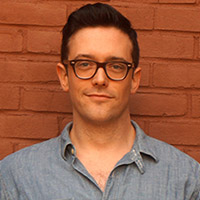 Each of these performances has taught me re-think what I know about art and inspiration, and they are with me every day when I write. In addition to a seemingly never-ending list of books I flip through daily—various back-issues of National Geographic featuring articles about Isle Royale (used as inspiration); a 1937 manual called Wolf and Coyote Trapping; the unbelievably inspiring/gorgeous Atlas of Remote Islands by Judith Schalansky; others—I am constantly harkening back to each performance, remembering them, and making sure that they are not forgotten. And I am reminded with every word I put down how astonishing and remarkable the performing arts are…how important they are to the production of any art.”
Each of these performances has taught me re-think what I know about art and inspiration, and they are with me every day when I write. In addition to a seemingly never-ending list of books I flip through daily—various back-issues of National Geographic featuring articles about Isle Royale (used as inspiration); a 1937 manual called Wolf and Coyote Trapping; the unbelievably inspiring/gorgeous Atlas of Remote Islands by Judith Schalansky; others—I am constantly harkening back to each performance, remembering them, and making sure that they are not forgotten. And I am reminded with every word I put down how astonishing and remarkable the performing arts are…how important they are to the production of any art.”
——
Robert James Russell is the author of two upcoming books: the collection Don’t Ask Me to Spell It Out (WhiskeyPaper Press, 2015) and the novel Mesilla (Dock Street Press, 2015). His first novel, Sea of Trees, was published in 2012. He is the founding editor of the literary journals Midwestern Gothic and CHEAP POP. You can find him online at robertjamesrussell.com and @robhollywood.”
Interested in learning more? Read our interview with Robert.
Educator Conversations: Brooklyn Rider
Editor’s note: This post is a part of a series of conversations between educators in the K-12 community. Educators will offer suggestions and answer questions about integrating UMS School Day Performances or the arts into classroom curriculum, as well as share advice on organizing a field trip to UMS. To volunteer to be a Teacher Lobby Moderator e-mail umsyouth@umich.edu. See other Educator Conversations here.
This week’s questions:
- What does “Brooklyn Rider” mean?
- How does a group like Brooklyn Rider learn to play different genres of music convincingly?
- What are some tips for listening to string quartet music?
This week’s moderator: Emily Barkakati is an Ann Arbor-based violinist, community educator, and teaching artist.
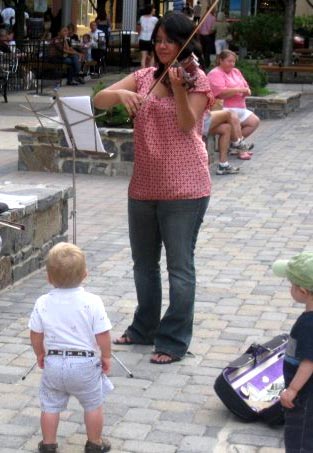 Emily is an Ann Arbor-based violinist, community educator, and teaching artist. She plays with the Michigan Opera Theatre and the Ann Arbor Symphony, organizes events for the Medical Arts Program, runs workshops, and teaches kids how to coordinate their finger hands with their bow arms. She loves crafting, cooking, and learning, and spends a lot of time with her husband and their emotionally dysfunctional cat.
Emily is an Ann Arbor-based violinist, community educator, and teaching artist. She plays with the Michigan Opera Theatre and the Ann Arbor Symphony, organizes events for the Medical Arts Program, runs workshops, and teaches kids how to coordinate their finger hands with their bow arms. She loves crafting, cooking, and learning, and spends a lot of time with her husband and their emotionally dysfunctional cat.
Q: What does “Brooklyn Rider” mean?
Brooklyn Rider’s name is a combination of inspiration from Der Blau Reiter (The Blue Rider) and the borough of Brooklyn in New York City. Der Blau Reiter was a pre WWI Munich-based artistic collective with members such as artist Vassily Kandinsky and composer Arnold Schoenberg. Brooklyn is the place the quartet considers home. The name “Brooklyn Rider” is meant to represent the collaborative spirit of eclectic art-making, both similar to what was found in Der Blau Reiter and in the rich cultural array found in Brooklyn, New York.
Whether it’s the title of a book, work of art, piece of music, or even historical event, there is often a lot that can be derived from something’s name. One of the many ways that students can explore this idea is through the analysis of their own names. For instance:
- What is the etymology of your first name? What about your last name?
- Were you named after anyone?
- Is there a cultural significance to your name? For instance, my last name “Barkakati” comes from my Assamese heritage, and I’ve been told by older relatives that based on traditional Indian naming conventions, our family would have historically been writers.
- Is there a nickname you prefer to go by? What do you think makes it a better representation of your personality?
- What if you could change your name? What would you pick and why?
Students can then use these questions to explore and gain ownership over their personal identities. This kind of exercise could also be expanded into an artistic activity, such as creating a work of art to represent one’s name.
Q: How does a group like Brooklyn Rider learn to play different genres of music convincingly?
Although I can’t speak for Brooklyn Rider, in my own experience I am a predominantly classically trained musician who only started dabbling with improvisation and cross-genre work only in the past few years. The first step I took in my preparation was to simply listen to a lot of music. This is a similar process to learning to write in different styles. Reading a wide variety of genres and authors expands your vocabulary and stylistic knowledge. In the same way, listening to a wide variety of music expands your aural vocabulary. That way when you start playing, you might not know the technical adjustments to achieve the correct sound, but you at least have a mental sound to strive toward.
For me, the most difficult part of jumping into new genres of music was getting over the fear of making mistakes. When I began learning to improvise, a friend of mine gave me the following tips to help me get comfortable:
- Pick a song that you know well.
- Play along with a recording of the song by ear.
- Play along with the recording again, but this time start adding some embellishments.
- Write down some new melodies that would fit into the song. Try playing them on top of the recording.
- Start making up some new melodies on the spot when playing with the recording.
- Remember that there is no such thing as a wrong note! If you play a note that sounds wrong, just turn it into a grace note or an embellishment.
It was important for me to build from my preexisting knowledge in order to gain confidence in my abilities. It also helped tremendously that I had friends who created a safe environment for me to experiment and to receive constructive feedback. The same process of building knowledge in stages, also known as scaffolding, is useful for learning any new genre.
Q: What are some tips for listening to string quartet music?
The key to listening to unfamiliar string quartet music, or any type of complex music, is active listening (as opposed to passive listening). One of the joys of complex music is that there are so many layers – you can listen to a piece many times in many different ways, and always find new exciting elements. At the same time, these many layers are exactly what can also make complex music seem overwhelming. Although different people have different approaches, the key for me is to remain open-minded and allow myself to react in the moment to what is happening. Below are some of the things I think about when listening to unfamiliar music for the first time.
- What are some adjectives that come to mind on my first hearing of the piece?
- Are there any particular melodies that stick out to me? Did I hear them more than once?
- Did the piece remind me of anything that I’ve heard before? Did it invoke any memories or mental images?
- What did I like the most about the piece?
- Is there anything about the piece that I found confusing? What about it was confusing? What are some ways that I can try approaching that section differently to better understand it?
While some believe that it is necessary to research new music in advance in order to understand it, I do not think that this is always the case. I usually prefer to explore my impressions first and then research after. This way my reactions to the piece aren’t influenced by pre-existing interpretations. However, keep in mind that this is just one of many ways to explore new music.
What do you think? Share your responses or questions in the comments section below.
New! Educator Conversations
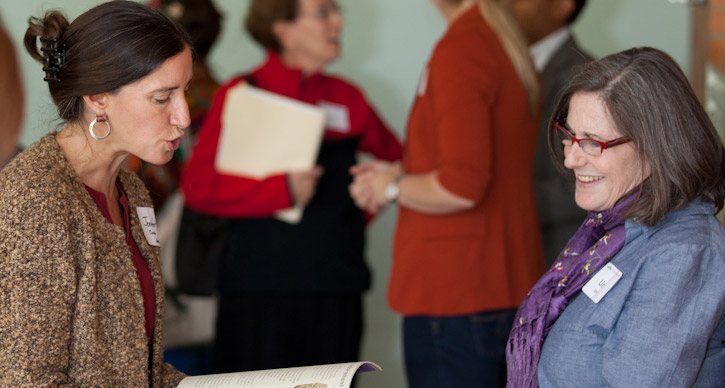
Photo: Emerson School educator Jennifer Tanau and UMS Advisory Committee member Linda Spector at a UMS reception for teachers. Photo by Mark Gjukich Photography.
This season, look for Educator Conversations on UMS Lobby.
Educators will offer suggestions and answer questions about integrating UMS School Day Performances or the arts into classroom curriculum, as well as share advice on organizing a field trip to UMS. To volunteer to be a Teacher Lobby Moderator e-mail umsyouth@umich.edu.
Educator Conversations will take place around UMS School Day Performances. As soon as the conversations are live, we’ll include a link on this page.
- Hubbard Street Dance Chicago with Melissa Poli (Performance September 27)
- Ukulele Orchestra of Great Britain with Katie Ryan (Performance November 12)
- Brooklyn Rider with Emily Barkakati (Performance November 25)
- One Night in Bamako with Jeff Gaynor (Performance February 7)
- Compagnie Käfig with Dianne Dudley (Performance February 13)
- Pedrito Martinez Group with Dan Tolly (Performance March 14)
- Jazz at Lincoln Center Orchestra with Wynton Marsalis with Linda Jones (Performance March 31)
Share you questions or comments below.
Presenting: UMS Tweet Seats Pilot Project
TWEET SEATS EVENTS
Tweet Seats 1: Aspen Santa Fe Ballet. Find out what happened.
Tweet Seats 2: Théâtre de la Ville: Ionesco’s Rhinocéros. Find out what happened.
Tweet Seats 3: Mariinsky Orchestra of St. Petersburg. Find out what happened.
Tweet Seats 4: Find out what happened.
WHAT ARE TWEET SEATS?
This season, UMS is launching a new pilot project: an experiment at the cross-section of live performing arts and technology commonly known as “tweet seats.”
Tweet seats refer to seats in which tweeting is permitted during the performance.
UMS has invited 5-7 people to participate in our tweet seats pilot project at 4 select performances. Only these 5-7 tweet seats participants will be permitted to use devices to participate in this pilot project; for the rest of the audience, our standard device policy applies (“Turn off all cellphones and electronic devices”).
The tweet seats participants will silence their phones and dim back-light to lowest setting; we’ve also prepared individual phone containers which will almost completely minimize any light emitted from the devices so that the experience of other patrons is not affected by tweet seats. Ensuring a smooth performance experience for all is our top priority.
At each of the 4 designated performances, participants are required to tweet 3-5 times using the hashtag #umslobby. No specific instructions for content of tweets are given. We’ll follow up with participants after the performance and chat with them about their experience; interviews will appear here on UMS Lobby.
You can follow or join the conversation after the performance here.
WHY TWEET SEATS?
Studies show that for some, engaging with technology is the preferred method of processing a performance and of “being present” at a performance.
In one such study, (“Making Sense of Audience Engagement”) Alan Brown & Rebecca Ratzkin refer to this subset of audiences as “technology-based processors.” They “love all forms of online engagement, and appear to be growing in number, especially among younger audience segments. Technology-based processors search for information online before and after the event. They connect with others on Facebook and other social media, and are most likely to read and contribute to blogs and discussion forums on the arts organization’s website. Their motivations are both intellectual and social in nature.”
So, we thought, let’s get together a group of people with differing attitudes towards technology to learn more about the effects of using technology during a live performance experience for all.
Our question: what can experimenting with technology teach us about being “engaged” or “present” at a performance?
OUR PARTICIPANTS:
We’ve pre-interviewed some of our participants so that you can get to know the range of attitudes that are part of the project. We asked them questions like:
- In one sentence, how would you describe your relationship with technology?
- What kinds of arts experiences do you like or look forward to most?
- To you, what does it mean to “be present” during a performance or another arts experience?
- What are you looking forward to in this experiment of experiencing performing arts with technology? What questions, concerns, reservations, or anxieties do you have about this experiment?
Learn more about them & their thoughts about technology and this pilot project below :
- Leslie Stainton, U-M School of Public Health Findings magazine editor and umslobby.org contributor
- Michael Kondziolka, UMS Director of Programming
- Mariah Cherem, Production Librarian at Ann Arbor District Library
- Paul Kitti, writer for iSPY magazine
- Mark Clague, U-M Associate Professor of Musicology and UMS Board member
- Greg Baise, Detroit-based concert promoter, arts writer, and DJ
- Garrett Schumann, composer, U-M Master of Music in Composition student, and umslobby.org contributor
- Neutral Zone and the University of Michigan participants
INTERVIEWS
UMS : Tell us about you. If you have an online presence you like to share publicly please tell us the relevant websites or user names/handles.
Leslie Stainton: I’m an editor at the UM School of Public Health and the author of a biography of Spanish playwright and poet Federico Garcia Lorca and a history/memoir of an American theater. My website is lesliestainton.com.
Greg Baise: I am Detroit-based concert promoter, arts writer, and occasional DJ. Some of my playlists can be found at vivaradio.com/lavie
Paul Kitti: I am a writer for iSPY Magazine, a monthly entertainment publication. I’ve spent the past two years covering a wide range of local events, including concerts, festivals, and screenings. Music and writing consume most of my brainpower, and I’ve found Ann Arbor to be an ideal environment for discovering new artists. In addition to journalism, I’ve held positions within U of M’s Athletic Department and Career Center. Magazine: http://mispymag.com/ LinkedIn: http://www.linkedin.com/profile/view?id=91711849&trk=tab_pro
Mark Clague: I’m an Associate Professor of Musicology, American Culture, African American Studies, and Non-Profit Management (whew!) at the University of Michigan School of Music, Theatre & Dance as well as a member of the UMS board. I tweet as @usmusicscholar and have a couple of WordPress blogs, including one on the bicentennial of the U.S. National Anthem (osaycanyouhear).
Michael Kondziolka: My name is Michael Kondziolka and I am the Director of Programming at UMS. My online presence is limited to Facebook and a couple of blogs that I regularly comment on.
Mariah Cherem: My love of music started with singing as a toddler, and has followed me through years of violin, various bands, and the occasional DJ set. My interest in how communities articulate their values through policy led me to EMU’s Arts Management MA program. A few years later, curiosity about online communities and the interplay between on and off-line behavior led me to UM’s School of Information. I now count myself extraordinarily lucky to be bringing all of these interests together in my work as a Production Librarian at AADL.
Garrett Schumann: I am a composer pursuing my doctorate in Music Composition at the University. In addition to writing music, I host a music show on Washington Public Radio called We Are Not Beethoven where the ever-changing place music holds in the 21st-Century world is discussed. Learn more at garrettschumann.com and follow me on twitter @garrt.
UMS: In one sentence, how would you describe your relationship with technology? OK, you can elaborate beyond this first “thesis” sentence if you would like.
Greg Baise: If a new record comes on vinyl with a digital download, I always opt for the vinyl over the cd. If the vinyl doesn’t come with a digital download, I buy the vinyl anyways.
Leslie Stainton: Troubled! I’m dependent on it, like everyone, and annoyed by it. I want it to do what I need it to do, and that’s it—I’m not a gadget person, don’t like games, don’t find technology interesting for its own sake. While I see the utility of social media, it strikes me as a giant time suck, and so I seldom engage—though I do enjoy blogging for UMS. I enjoy the way it makes me think more deeply about what I’ve seen onstage. I’ve done some tweeting and Facebook posting for the School of Public Health, but not enough to feel confident or particularly comfortable in either area.
Mariah Cherem: Technology can be fun and fascinating and super-mind-blowingly-cool, but I’m most interested in how people use it to connect to each other, to information/resources that they need, and to things that they’re passionate about. Also, I think our definitions of what constitutes “technology” are constantly shifting. A pen or a typewriter doesn’t seem like technology now, but there was once a point when it did.
Michael Kondziolka: I have an enigmatic relationship with technology. I tend to be a late adopter….and, while I accept that technology is here to stay, I sometimes bemoan its impact on our culture. In my view, the irony of “connectivity” embedded in much of mythology/ideology of social media is one of the great farces of our time: users seem decidedly less connected. (This is in no way an insightful observation as much has been written on the topic.) This fundamental concern aside, I can be a fanatical user of technology from time to time and I don’t think I could give up my iPhone at this point. I have social media sites that I use on a semi-regular basis. At the end of the day, I have a very healthy skepticism and think it is important to push back on assumptions in all sectors of life.
Garrett Schumann: I believe the Internet Web-based media have created a new and unprecedented aesthetic experience in the 21st Century, and it is imperative for those involved in the performing arts and other parts of culture to interact with and embrace those technologies if their work is to remain relevant to society at large.
Paul Kitti: I’m an email addict, avid texter and internet junkie with a loyalty to Apple products. Despite growing fully accustomed to the constant technological buzz of my generation, I still prefer hard copies of books and magazines.
Mark Clague: I enjoy exploring technology for new views on our world and to grow my own creativity, skills, and perspectives.
UMS: This pilot includes a broad range of performing arts experiences: theater, dance, global music, orchestral performance. What sorts of performing arts experiences are you most familiar with? More broadly, what kinds of arts experiences do you like or look forward to most? What do you wish to have more experience with?
Leslie Stainton: I did my BA in drama and my MFA in dramaturgy, so I’m passionate about live theater and know a fair amount about it, or at least once did. I’ve studied dance off and on and am interested in the form, though don’t know as much about it as I probably should. Ditto music: I’m married to a musicologist, and we attend many concerts and talk about music and listen to it at home. But I’ve never taken a theory course so don’t understand it in the kind of depth I’d like. I’m far more drawn to classical music than to popular forms, jazz, country, or so-called global music. I adore museums—think of them as spiritual centers and seek them out almost every time I travel—and spent six years working for UMMA. I’m interested in arts experiences that provoke and challenge, that cross traditional genres and boundaries, that make me think more profoundly.
Mariah Cherem: I am most interested in (and luckily can attend) the orchestral performance and the performance by Gilberto Gil. In general, at some point I’d love to do UMS “Night School” related to a dance performance, as that’s an area I feel that might help my enjoyment even more.
Greg Baise: In music, I’m mostly familiar with rock, world music, contemporary classical music and modern dance. I’m very interested in art history in general, and modern art in particular, especially stuff that’s too current for the latest art history surveys. I’d love to get deeper into experimental theater and more modern dance.
Paul Kitti: I’ve played a couple instruments and attended several classical concerts. The most memorable performance I’ve witnessed was “Einstein on the Beach” as presented by UMS earlier this year. My knowledge about theatre and dance is limited, although I’ve grown more and more interested in these types of productions over the past year. The art-related experiences I look forward to most are the ones involving music and/or acting.
Garrett Schumann: Because I am a composer I am most familiar with music and musical performances. However, I love all kinds of performing arts and cultural experiences from dance shows to theatrical performances and, particularly, contemporary arts exhibits.
Michael Kondziolka: Relatively speaking, I have a lot of experience with most forms of the performing arts and a passing familiarity with the others. I am least familiar with some forms of contemporary popular music and culture. I look forward to a broad range of experiences from the very traditional to the very experimental.
Mark Clague: My primary arts experience is as an orchestral musicians (bassoonist), but I also masquerade as a photographer, saxophonist, and singer. Inspired by John Cage, I like to challenge myself to explore new kinds of art and to open myself up to new ideas and experiences. Thus I’ve increasingly attended UMS dance, theater, and world music events to stretch beyond my orchestra and jazz comfort zone.
UMS: Why did you decide to participate in this project?
Michael Kondziolka: As a way of testing my own, sometimes staunch, assumptions.
Greg Baise: UMS’s programming plays a huge part in my cultural activities. HUGE. I’m still astounded that within the past year I’ve seen the Gate Theatre, Einstein on the Beach, and Jessye Norman perform John Cage, all thanks to UMS. I hope I can contribute through these tweet seats and raise awareness of UMS’s presence and programming. And I’m honored to be asked to participate.
Mariah Cherem: In general, I think very highly of UMS’s programming. I’m not often able to attend that many performances, however, due to time and budget constraints. I’ve been interested in how various technologies can help or hinder enjoyment or engagement in experiences (in this case, it’d be performances). I’m not sure that I think that Tweeting about performances is really quite right for me, but I’m willing to give it a shot and try it in the name of experimentation. This idea pushes me a little bit out of my comfort zone of “things I tweet about” or talk about online, and I think that nudging around one’s boundaries now and then is important.
Garrett Schumann: I use twitter a lot in my life both for fun and for professional purposes, so I feel like I am experienced enough with the technology to contribute a meaningful opinion to this project’s discussion. Also, I think the tweet-seat question is emblematic of performing arts organizations’ struggle to maintain relevance in the 21st-century.
Paul Kitti: I appreciate what UMS brings to Ann Arbor, and I’ve immensely enjoyed my past experiences with their productions. Honestly, the opportunity to witness and participate in these events is something I knew I couldn’t pass up.
Mark Clague: I’ve heard a lot of buzz about Tweet Seats and enjoyed the few times I’ve surreptitiously tweeted at an arts event and thus wanted to try it out for myself when it was “legal.”
Leslie Stainton: Because I’m addicted to working with UMS?!
UMS: To you, what does it mean to “be present” during a performance or another arts experience?
Garrett Schumann: Obviously, attending an event is step one to ‘being present’, but I think the phrase involves incorporating the experience you’ve had at a concert/performance into your life at large. By this, I mean talking to people you know about what you’ve seen/heard, breaking down your experience in conversations and sharing it with others either online or in person.
Greg Baise: Hmm. Present? Paying attention. Learning. Enjoying. Not distracted. Taking it in in the present, and remembering it for later, too.
Paul Kitti: Art requires the beholder to suspend all preconceptions and unrelated thoughts; to be present during an arts experience is to lend your mind as best as you are able to what is before you, constantly trying to identify the message, meaning, uniqueness or beauty of what you’re seeing and hearing.
Leslie Stainton: To shut out the workaday world and become utterly absorbed in the experience at hand; to come away with some new understanding.
Mariah Cherem: The ideas of presence and focus are those that I struggle with most when thinking about how this experience might go. For me, I often don’t want to be the lens – don’t want to be capturing pieces of something, as then I become detached. Even at rock shows, I get a little annoyed when the guy in the front feels the need to film everything instead of just getting into it and being “in the moment.” However, at the same time, I think that there may be potential for people to raise awareness of their experience of a particular musician, play, etc. via social media channels. I don’t want the arts to get lost in our larger conversations because we “shouldn’t” be talking about them in some way or another – using some tech or another.
Mark Clague: It’s more than just physically attending; To be present is to connect with the art and engage with it, allowing the motivations, messages, and even the spiritual dimension of the art to converse with you. For me Twitter is one way to honor that conversation by translating my nebulous experience into 140-character thoughts, documenting and sharing these, and potentially chatting with others about these reactions.
Michael Kondziolka: This, for me, is the nub of the issue. I do not tend to believe that a mediating device can truly help in this regard. Of course, there are tools that can help mediate the experience and enhance it — infra-red listening devices, subtitles, etc. But, at the end of the day, those are mediating tools which are necessary to aid the user in accessing some aspect of the presentation that they otherwise could not. Critique, the intellectual processing and analysis of what has happened, starts during the performance but is codified through words after the performance. (“How can I put this experience into words….?”) Even a non-critique, a purely emotion-based exclamation – “I loved that!” — to be tweeted, takes one out of the experience. I have yet to understand what/why/how the dimension of time plays into all this. I can’t wrap my head around why something tweeted in real time — at the moment it is felt or realized during a performance — is more valuable than something tweeted during a natural break in a performance — at intermission or after the show. (“Wow…impressive return to the tonic key!”) That is how we have always tended to process our collective experiences pre-technology…and I don’t understand why we frame the real-time possibilities offered by tweeting to be somehow better…or an improvement. (It may be, as umsLobby’s Musiclover would call it, a “disimprovement.”) I view the communication that takes place between a performer and an audience member — whether it be lyric, declaimed or movement based – to be sacred. Therefore, anything that breaks that bond is anathema to the notion of being “being present.” I also subscribe to basic norms, rightly or wrongly, of what I was taught to believe are civil manners — if someone is speaking (or performing) they deserve your full attention.
When I really drill down on this topic, I realize that I actually believe that the use of technology in new and possibly intrusive ways — in this instance, as part of the performance experience — is most probably an ideological metaphor of independence: a classic moment of generational division.. (“Look Ma, we have our own ways of doing things.”) And that ideological position probably exists outside the forum that is being created to address this question.
UMS: What are you looking forward to in this experiment of merging performing arts with technology? What anxieties, concerns, reservations, or questions do you have about this experiment?
Paul Kitti: I’m looking forward to simply experiencing these productions, and the chance to offer input and be engaged through technology is kind of an added bonus.
Greg Baise: I’m looking forward to new cultural experiences, and sharing my impressions and observations. And also getting feedback – I hope I say stuff that’s of interest to both my friends and to total strangers. I might be a little reserved about thinking about (or over-thinking) what I tweet, maybe to a point where I’m concentrating more on the tweet than the performance. Also, I’m concerned about interfering with the enjoyment of others through use of technology and wonder how isolated we will be from the general audience.
Michael Kondziolka: I am looking forward to the basic act of testing one’s strongly held views. I am most concerned about breaking the scared bond and I take solace in the fact that I can go again and have the same experience in a completely unmediated, truly present, way on a subsequent evening. Anxiety would come in the form of worrying that, through my actions, I am interfering in someone else’s sacred moment.
Leslie Stainton: I’m honestly not sure about my ability to tweet—haven’t quite gotten the hang of 140 characters and don’t really understand hashtags. I’m also frankly worried about the ADD element of all this—trying to multitask while watching a performance. I’m not at all sure I’ll enjoy the experience or want to repeat it, but I’m sufficiently curious I’m willing to try it once.
Mariah Cherem: I think that my answers to the two questions above actually already hit on these points! : )
Garrett Schumann: I’m most interested in the arguments against allowing twitter into the concert hall. Because I am unabashedly in favor of the ‘tweet seat’ idea, my bias tends to inhibit my ability to relate to the dissent that is out there, and I look forward to an opportunity to learn more about viewpoints that oppose mine.
Mark Clague: I’m looking forward to the real-time conversation with other Tweet-seaters; my only worry is in getting criticism from other patrons who either think we’re doing something wrong or who just personally object to social media in an arts event.
Stay tuned for more interviews with our participants about their experiences over the course of the pilot project.
[PLAYLIST] UMS Staff Summer Music Picks
Summer is here. We asked our UMS staff to submit songs that say “summer” to them. Our picks:
Artist: The Decemberists
Song: July, July!
Why: JULY!
Picked by: Truly Render, Press & Marketing Manager
http://www.youtube.com/watch?v=grUyiQKc2Hc
Artist: Nat King Cole
Song: Those Lazy-Hazy-Crazy Days Of Summer
Why: His voice inspires summer – fun, restful, and the freedom you feel in the summer (at least when we were all young and had summers off).
Picked by: Cindy Straub, Advisory Committee & Events Coordinator
Artist: Aaron Copeland
Song: Appalachian Spring
Why: Summer favorite.
Picked by: Jerry Blackstone, Conductor UMS Choral Union.
Artist: Limbeck
Song: Julia
Why: My favorite band ten years or so ago (and possibly still today, if forced to choose), was a group called Limbeck. They’re from California. They love Gram Parsons and Brian Wilson. They write alt-country, nostalgia-fueled tunes inspired by road trips and friends. This particular song, Julia, was released as part of a recording called Hi, Everything’s Great—the CD liner notes were a series of “postcards,” one per song, each with a hazy photograph taken by the singer and a short written memory about the inspiration for each song. It came out in June of 2003—I remember buying it at Vertigo Records in Grand Rapids with no prior knowledge of the group, and proceeding to listen to it on repeat during my entire drive back to Ann Arbor in a car that had no working AC.
Picked by: Mary Roeder, Residency Coordinator
Artist: R.E.M.
Song: Night Swimming
Why: Summer favorite.
Picked by: Marnie Reid, Manager of Individual Support
Artist: XTC
Song: Summer’s Cauldron
Why: It has the word “summer” in the title, the lyrics are all about summer, and it has the sound of crickets incorporated into the song… kind of hits you over the head that it’s a song for summertime. I’m a little embarrassed to list this song, though, because it both dates me and pegs me… psychedelic bubblegum for aging punker wannabees.
Picked by: Lisa Murray, Manager of Foundation & Government Grants
Artist: The Rapture
Song: First Gear
Why: Best roadtrip song ever. Just try not to speed.
Picked by: Truly Render, Press & Marketing Manager
Artist: The Lovin’ Spoonful
Song: Summer in the City
Why: Love this song. It came out when I was in middle school and we all danced up a storm to it. When I hear it now, I have to crank up the sound and dance like a fool.
Picked by: Cindy Straub, Advisory Committee & Events Coordinator
Artist: Bob Marley & The Wailers
Song: Three Little Birds
Why: Summer favorite.
Picked by: Marnie Reid, Manager of Individual Support
Artist: Recorded by Stan Getz, Antonio Carlos Jobim, and Astrud Gilberto.
Song: Corcovado
Why: Bossa nova at its languid best.
Picked by: Lisa Murray, Manager of Foundation & Government Grants
Artist: Frank Sinatra
Song: Summer Wind
Why: Along with featuring the word summer in its title, this song is top of the playlist when the weather gets nice, sunglasses go on, and the windows in my car get rolled down….
Picked by: Mike Michelon, Project Administrator
Artist: Vampire Weekend
Song: Holiday
Why: There’s something distinctly beachy about the breezy guitar driven beat; a great song to play as you drive out of town for the weekend.
Picked by: Jim Leija, Director, Education & Community Engagement
Artist: Beach Boys
Song: Surfin USA
Why: The sound of this song makes me conjure up thoughts of the surf in California, you can hear the water rushing in and out. I lived in CA when I was first married, and my husband was in the Navy stationed in Oakland, CA. It brings back happy memories of the times we spent at the beach along Highway 1.
Picked by: Kathy Brown, Executive Assistant
Artist: The Black Keys
Song: Lonely Boy
Why: Summer favorite.
Picked by: Sarah Wilber, Group Sales Coordinator.
Artist: Mungo Jerry
Song: In the Summer Time
Why: I accompanied my sister and some close friends on a couple of “hike in” camping trips, and this was the favorite song of one of the other campers. She would sing it all the way to the campsite and throughout our camping time. It always reminds me of summer and those wonderful times on the shores of Lake Michigan.
Picked by: Anne grove, Artist Services Manager
Artist: Robin Ward
Song: Wonderful Summer
Why: This was such a beautiful song, it reminds you of anyone who has ever experienced a summer romance, then had to leave their true love behind. Plus, it was a great “slow dance” song.
Picked by: Kathy Brown, Executive Assistant
Artist: Sandro Silva & Quintino
Song: Epic
Why: I love the way this soft-house track builds up to the beat drop about forty seconds into the song. It reminds me of the electronic music festivals that happen across the country throughout the summer months, and makes me want to dance!
Picked by: Sophie Kruz, Video Editor
Artist: Christopher Cross
Song: Sailing
Why: It’s an oldie, but brings back great memories of past summers and relaxing times away from time pressures.
Picked by: Jerry Blackstone, Conductor UMS Choral Union.
Artist: Lily Allen
Song: LDN
Why: Perfect bike commute song. Not that you should ride with your iPod on. That is bad. Tisk.
Picked by: Truly Render, Press & Marketing Coordinator
Artist: The Samples
Song: Did you ever look so nice
Why: Every summer when I visit my sister’s family, we spend time lounging in & around the pool. Her husband makes a mix CD for each summer and this is one song from the 2003 mix. when I hear it, it puts me right back in the pool on a lazy summer day.
Picked by: Anne grove, Artist Services Manager
Artist: Kanye West
Song: Champion
Why: We should all occasionally enjoy songs that get our speakers bumping below 100Hz. “Champion” is a great song to remind us that summer starts when school finally lets out…
Picked by: Mike Michelon, Project Administrator
Artist: Reptar
Song: Isoprene Bath
Why: My new obsession is a group called Reptar (a reference to a character from the Nickelodeon cartoon, Rugrats). They write some truly bizarre and yet somehow still catchy pop songs that seem equally inspired by surf rock as they are by West-African rhythms—the stuff of summertime, musically-speaking. As evidence, I offer this track entitled Isoprene Bath. Forgive the title and trust me (and them)—if for no other reason than they’re from Georgia—it’s always summertime there.
Picked by: Mary Roeder, Residency Coordinator
Artist: k.d. lang
Song: Summerfling
Why: The Beach Boys vibe combined with a tale of summer love and Lang’s powerhouse vocals make this one of my favorite lounging on the beach tunes.
Picked by: Jim Leija, Director, Education & Community Engagement
Artist: Dave Matthews Band
Song: Stay (Wasting Time)
Why: I spent a few good years as a Dave Matthews fanatic which resulted in many mini-road trips to lots of summer concerts around the Midwest. While my Dave obsession has worn off, this song always evokes the feeling of how much I love enjoying a great concert in beautiful weather at an outdoor venue in the summertime!
Picked by: Liz Stover, Programming Coordinator
Artist: Tupac
Song: California Love
Why: Summer favorite.
Picked by: Sarah Wilber, Group Sales Coordinator.
What are your summer music favorites? Share them in the comments below.
People are Talking: New Look for UMS Lobby
As you may have noticed, the UMS Lobby has a new look! We’ve re-designed for a sleeker, more user-friendly experience.
Click on image below to zoom in to see some of the new features:
We would love to hear what you think! Please leave your comments about what you like, and what you’d like to see improved.
People are Talking: UMS Night School – Session 4
UMS Night School is a free and open to the public series of “classes”, which include a 30-minute discussion of each performance in Pure Michigan Renegade, plus a 60-minute intro session for the next performance on the series. You’ll find follow-up conversation, coverage, and materials here on the Lobby.
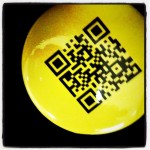 See someone with this button? Start a conversation about ‘renegade’ works.
See someone with this button? Start a conversation about ‘renegade’ works.
SYLLABUS
HOMEWORK
“Required Reading” and “Required Watching” from Malcolm Tulip, Associate Professor of Theatre at U-M
1. The Turnip Princess: a newly-discovered fairy tale
“Once upon a time, the historian Franz Xaver von Schönwerth collected fairytales in Bavaria, which were locked away in an archive until now.”
2. Interview with Robert Lepage for Theatre Music Canada.
In Lypsinch (2007) Lepage intends to “show us a mosaic of human struggles for identity, to assemble a composite portrait of contemporary society voicing over and dubbing out our primal emotional needs. Lepage wants to make us aware of how we control and doctor the sounds surrounding us to cover up the voices of those in genuine need.” via Village Voice
3. Director Robert Lepage Speaks on what inspired him to create The Nightingale & Other Short Fables, a collection of works by composer Igor Stravinsky that made its world premier in October 2009.
4. More about The Andersen Project
A slideshow of images from the production
Preview in Paris Voice: “the piece is not a retelling of any one of Anderson’s tales but rather an open-ended study, undertaken to examine, create around and perhaps finally understand better both the creator and his work.”
5. More about Hans Christian Andersen
The Hans Christian Andersen Center (with complete works)
The Dryad
The Shadow
Elsewhere on the Lobby:
Our interview with The Andersen Project’s lead actor Yves Jacques, and 5 Things to Know About The Andersen Project.
YOU SUGGESTED…
We’ll add your suggestions for further reading, listening, and watching here.
What did you think of this session of Night School? What’s still not making sense? What are you excited about?
RENEGADE Contest – Win Tickets!
This winter’s Pure Michigan Renegade series, a 10 week, 10 event series focusing on “renegades” examines thought-leaders and game-changers in the performing arts.
What’s a renegade to you? How do you know when a performing arts work or artist is truly game-changing, experimental or history-making?
Give us your answer in 7 words to enter to win tickets!
THE DETAILS
WHAT: UMS “What’s a Renegade?” Contest
REQUIREMENTS: Your definition of a performing arts renegade artist or work in exactly 7 words. This contest is free. Entries judged on creativity, renegade-ness.
DUE: January 12th, 12PM Noon.
PRIZES:
1st place: Pair of tickets to your choice of concert at San Francisco Symphony’s American Mavericks with Michael Tilson Thomas.
2nd place: 2 very special reserved seats to Robert Wilson & Philip Glass at the Michigan Theater as part of the Penny W. Stamps Speaker Series. Conversation led by acclaimed theater director Anne Bogart.
HOW TO ENTER:
(1) Tweet your entry @UMSNews
(2) Add your entry as a comment on UMS’s Facebook page during the contest period. You must label your comment as a Renegade Contest entry.
(3) Add your entry as a comment in the comments section below.
Winners to be announced by January 12th, 5PM. Questions? Ask in the comments below.
Bonus Video: Renegade composer John Cage at a game show in 1960.
http://www.youtube.com/watch?&v=7KKE0f1FGiw
Thanks to everyone who entered! Our winners, selected by UMS staff, are:
1st Place
Lesley Criscenti
Bold experimentation,
freewheeling risk,
opening minds meet.
2nd Place
Elle Bigelow
Apostate creativity
Distorting the norm
Delicious tension
Check out more of our favorites here. What was your favorite 7-word renegade definition?
Share your “Messiah Memories”
An annual tradition since 1879, UMS’s presentation of Handel’s Messiah has become a “signature” Ann Arbor experience. We’re so grateful for the participation of the community in this event year-after-year, and we hope you’ll share with us some of your favorite Messiah memories: how many years you’ve attended, why you look forward to Messiah every year, what makes this event special to you, little remembrances…
I’m posting a video interview here with UMS usher Paul Bianchi who attended his first Messiah last season. Scroll ahead to minute 3:20 for his special memories.
And let the holiday season begin!
Michael Tilson Thomas Conducting Master Class: Win Your Seat!
As part of the upcoming residency with the San Francisco Symphony, Michael Tilson Thomas will lead a conducting master class on Sunday, March 21 at 10am with members of Kenneth Kiesler’s U-M conducting studio and the University Symphony and Philharmonia Orchestras. As seating for observation is very limited, we’ve decided to reserve 2 seats each for up to 5 lucky winners of this contest!
We’re seeking answers to this question: “What does it mean to be a conductor?” Answers do not have to be related to music. We’re looking for interesting, compelling, and creative entries, and entries can be submitted in any format (writing, music, video, artwork, photos—be creative!).
To enter, please post your entry in the comments section below, and make sure to leave an email address so that we can contact you. Comments can be text or links to external sites hosting photos, music, or video.
UMS staff will vote on the winning entries and announce the winners on Thursday, March 18. Entries must be posted here by 5pm on Wednesday, March 17 to be considered.
We look forward to your responses!


